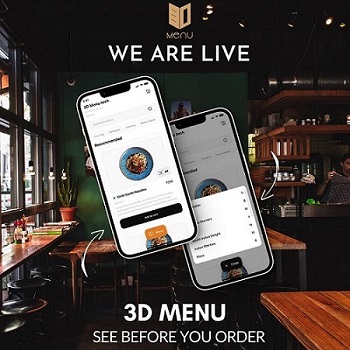In today’s age of high-end technology, it is important for every industry to keep innovating itself to meet the demands and expectations of consumers. There is a need for innovation in the food and hospitality industry as well. Typically, when you visit a restaurant, you have to go through a menu and then order the dishes you would like to eat. However, a physical menu, with all the dishes available at the restaurant listed on it, does not always prove to be the best guide.
Sometimes, you order a dish that you haven’t tried before and end up being disappointed by it as it doesn’t match your imagination of what you thought the dish would be like. In part because, when you read the name, or sometimes accompanied by a small description, of a dish on the menu, there is no way for you to know more about it. Asking the staff could help, but only to a certain extent.
To resolve these issues faced by the patrons visiting restaurants and hotels, three young entrepreneurs, Akshay Narayankar, Arnaw Gundawar and Shubham Sonawane, came up with an idea that was rooted in the world of new-age technology. These three entrepreneurs believed that a 3D menu card will not only make it easier for customers visiting a restaurant to order the right dishes but would also offer them a more immersive experience.

Talking about what led to the team come up with this idea, co-founder Akshay Narayankar, “While some people like to order tried-and-tested dishes when they go to a restaurant, there are many who wish to try something which they haven’t tasted before. However, in the pursuit of trying various kinds of food items or cuisines, they face several challenges. Before ordering a dish, they have no idea about, they would want to know several aspects pertaining to it like how it looks, the kind of ingredients used in it and whether it would appeal to their taste buds. A 3D menu card resolves all these issues by offering them a glimpse of high-quality food models represented in their original size, shape, and form.”
Many restaurants in India have already started using 3D menu cards. Apart from feeling good about the fact that have adopted themselves to modern technology, the owners and management of these restaurants have reported a positive jump in their sales figures. Clearly, their customers are very pleased with the introduction of 3D menu cards in these restaurants and are happy to see things being made convenient for them.
Elaborating further on this product, co-founder Arnaw Gundawar says, “Our product 3DMenu is created using world class technologies and provides an immersive experience enabled by Augmented Reality. The product enables the creation of a realistic food model with the help of machine learning integrated with animation software. The 3D menu card also comes equipped with best-in-class visualisation to ensure the customer finds it much easier to decide the dishes they want to order. The technology we have come up with is an optimised combination of a variety of 3D modelling tools and cloud first technologies. It is a robust and highly performant solution with a lot of new features in progress.”

For the longest time, restaurants have offered customers the option to go through physical menus. Since the last few years, some of the upmarket restaurants, cafeterias and eateries ditched physical menus for digital menus. A link to the digital menu would be shared by the customer on their smartphone, tablet or some other smart device and they would be ask to place an order after going through it. Unfortunately, apart from saving paper, these digital menus didn’t do much in the way of taking advantage of their digital platform.
“We should not create any innovation just for the heck of it. Good innovation is the kind that makes a real difference to the lives of people. A 3D menu is better than a physical menu in every possible way. When you pick up a physical menu, you only get to read the names of the dishes on the menu and sometimes, see a few pictures, and rarely do these pictures portay the reality of what the dish will be like. A 3D menu, on the other hand, is highly interactive. Using a 3D menu, customers will be able to view 3D models of dishes in AR and also have the opportunity to see the dishes from different angles. They can also share their feedback on the menu. Customers can also filter the menu based on their dietary restrictions and food preferences”, states co-founder Shubham Sonawane.
Though investing in a 3D menu card costs a bit of money initially, it proves to be a cost-effective product in the long run owing to reduced printing and distribution costs and the sales benefits that it can provide. Many restaurants, hotels, cafes and eateries of different kinds across India have already benefitted hugely by switching to 3D menu cards and many more are expected to follow soon in the near future. It is certain that 3DMenu, the innovative product by Akshay Narayankar, Arnaw Gundawar and Shubham Sonawane will surely play a key role in bringing a new revolution in the hospitality industry.
